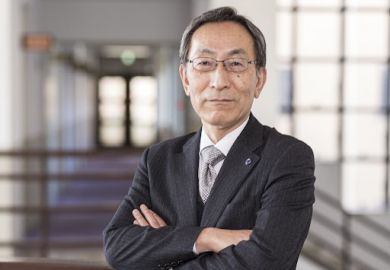Take a stroll from London’s West End towards Fleet Street and you will encounter an unexpected legacy of Sir Ed Byrne’s leadership of King’s College London: a leafy civic space bustling with students criss-crossing a section of the Strand that was once clogged with traffic.
“It was a real battle to get that done,” reflected Sir Ed on the revamp, which was conceived in 2015 but not delivered until December 2022, nearly two years after he ended his seven-year term of office.
While city authorities eventually stumped up the £18.5 million for the changes, the move to pedestrianise of one of London’s busiest roads clicked into gear only once King’s took over Bush House, the grand former home of the BBC World Service, in 2015. With King’s occupying both sides of the Strand, uniting the campus became a necessity. “That was a gamble, however,” recalled Sir Ed. “We needed to move some faculties there and create some new ones,” he explained while outlining how the ambitious acquisition was financed.
Financial considerations and fraught negotiations with municipal authorities are, however, unlikely to factor hugely in his latest university leadership role – the presidency of King Abdullah University of Science and Technology (KAUST). Sometimes described as “the Caltech of the Middle East”, Saudi Arabia’s flagship research university was founded in 2009 with a $10 billion (£7.8 billion) endowment, which has since doubled to $20 billion – a sum bettered only by six of America’s best-known universities, and roughly double the University of Oxford’s £8 billion fund.
Arguably as important is the close involvement of Saudi Arabia’s de facto ruler, Mohammed Bin Salman, prime minister since 2017, who chairs KAUST’s board of trustees and announced the university’s strategy live on television in August 2023.
That backing for KAUST and enthusiasm for what higher education more generally can achieve is what persuaded Sir Ed to end his retirement in Australia, where he led Monash University from 2006 to 2014. “Throughout nearly 20 years of leading universities, I’ve been fortunate because I’ve arrived at times of great optimism – at UCL, where I helped to set up the Crick [Institute], it was optimistic, and King’s was optimistic and at Monash, too,” he said.
Things have, however, become “more turbulent” in the UK, Australia and the US since he stepped back from academia, said Sir Ed. “Huge expectations on universities are still there, but the massive good that they do – educating the country’s professional workforce, helping to inspire new companies and industries – has been obscured by political arguments fiercely fought over higher education.”
That zeal for research and higher education is still evident in Saudi Arabia, where KAUST and other universities are being asked to play a central role in the country’s Vision 2030 strategy. “This is a massive transformation of the country – both economically and culturally, and KAUST is very much at its heart,” said Sir Ed, who noted that the institution’s research will address some of the region’s biggest issues, such as producing clean energy, desalinating water and protecting the ecology of the Red Sea, on which the university sits outside Jeddah.
As Saudi Arabia’s first mixed-gender university, KAUST has also played a role in catalysing broader societal change that was unimaginable in the early 2000s, argued Sir Ed.
“Everyone will see there is more to happen, but 40 per cent of women are now in the workforce, and you see as many women as men driving on the roads, and they are going out by themselves,” he said.
Only weeks into his latest presidency, Sir Ed has yet to put his own stamp on KAUST, but the 72-year-old cautiously suggested that undergraduate students might one day play a role at the institution, which is currently graduate-only. “For all that research universities do, one of the major achievements is the young people that come through its doors and what they do,” he said.
Notwithstanding that, “KAUST will always have a postgraduate emphasis,” he added. “It is the place that has Caltech-level excellence and will produce Saudi Arabia’s first Nobel prize, entrepreneurial start-ups and a significant number of unicorns.
“My job is to embrace and acknowledge what has been achieved so far – with Nature and Science papers galore – but also help it to find a higher gear. KAUST has already done brilliantly on the research side, but I think it can move forward with the applied side of things without diminishing that journey.”
Having successfully led two world-class institutions, Sir Ed knows something about running research universities. Yet for all the challenges of bringing top research talent to the Gulf, he seemed galvanised by the clear political will to turn KAUST into a globally significant university.
“The crown prince is determined to see oil wealth used in a way that drives transformation and balances the economy. I’ve spent time in Australia, where profits from natural resources have often gone into private pockets; so it’s good that public wealth is being geared towards a wider transformation and that KAUST…is very much part of this,” he said.
后记
Print headline: Saudi Arabia’s ‘faith in HE is undimmed’




